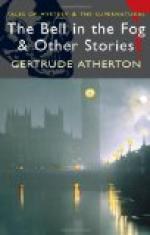Andrew had not a confiding nature, but he could not repress a dark flush. The astute little journalist understood it.
“It’s too bad you didn’t bring a letter or two. One would have made it easy work. You look as well as any of them, and you’ve got the boodle. Where did you come from, anyway?”
“New York.”
Chapman puckered his lips about his cigar. “That’s bad. It’s harder for a non-commissioned New-Yorker to get into society than for a district-attorney to get into heaven. Didn’t you make any swagger friends at college?”
“I never went to college.”
“Too bad! A man should always strain a point to get to college. If he’s clever he can make friends there that he can ‘work’ for the rest of his life.”
Little by little, with adroit use of the detective faculty of the modern reporter, he extracted from Webb the tale of his years—even the extent of his fortune. The young aspirant’s ingenuousness made him gasp more than once; but he had too kindly a nature to state to Webb the hopelessness of his case. His new friend was manly and generous, and had won from him a sincere liking, tempered with pity. Better let him find out for himself how things stood; then, when his eyes were open, steer him out of his difficulties.
He rose in a few moments. “Well,” he said, cheerily, “I wish I were Lancaster. I might be able to do something for you: but I’m not in it—not for a cent. You may as well take in the passing show, however. The first Casino hop is on to-night. Put on your togs and go.”
“Anybody there?” asked Andrew, loftily.
“Oh, rather. All the cottagers will be there, or a goodly number of them. And it’s a pretty sight.”
“But how can I get in?”
“By paying the sum of one dollar, old man.”
Andrew’s cigar dropped from his mouth.
“Do you mean to say that they go to a place and dance—in full dress—on the floor—with everybody? Why, any one can pay a dollar.”
Chapman laughed. “Oh!—well—go and see how it is for yourself. Meet me in the gallery at ten, and I’ll tell you who’s who. Au revoir.”
* * * * *
At half-past nine Andrew stood before his mirror and regarded himself meditatively. Without vanity, he could admit that so far as appearance counted he would be an ornament to any ballroom. His strong young figure carried its evening clothes with the air of a gentleman, not of a waiter. He had seen fashionable men in Delmonico’s who needed their facial tresses to avoid confusion. Chapman had that day pointed out to him two scions of distinguished name whose “sideboards” had caused him to mistake them for coachmen. He stroked his own mustache. It had never been cut, and was as silken as the hair of the ladies he worshipped. His head had been cropped by the most fashionable barber in New York. He wore no jewels. In a word, he was correct, and he assured himself of the fact with proud humility. Nevertheless, his heart was heavy behind his irreproachable waistcoat.




